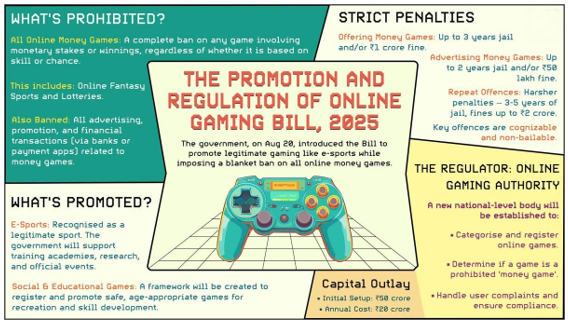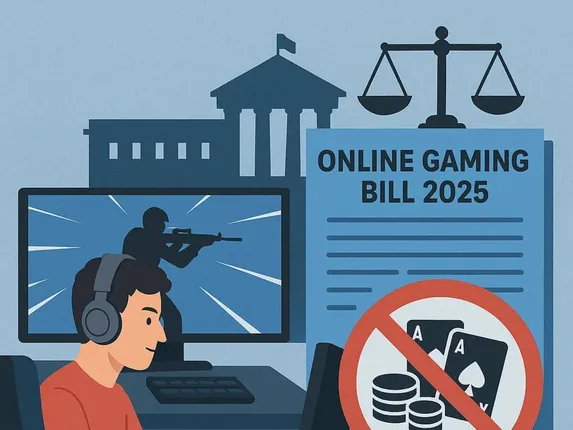SYLLABUS
GS-2: Parliament and State legislatures—structure, functioning, conduct of business, powers & privileges and issues arising out of these.
Context: Recently, Parliament has passed the Promotion and Regulation of Online Gaming Bill, 2025.
More on the News
- The Bill was introduced in the Lok Sabha on August 20, 2025, where it was passed the same day and subsequently cleared by the Rajya Sabha on August 21, 2025.
- The Bill seeks to prohibit online money games and promote and regulate certain other online games.
Key provision of the Bill
Prohibition on online money games
- The Bill also prohibits advertising and facilitating financial transactions for such games.
- It empowers the central government to block any information related to online money gaming services from public access.
Promotion of e-sports
- The Bill empowers the central government to take steps for recognition and development of e-sports and online social games.
- The central government may:
- create a mechanism for registration of e-sports and online social games,
- specify guidelines for conducting e-sports events,
- establish training academies for e-sports,
- incentivise promotion of e-sport technology platforms, and
- support initiatives that increase public access to safe social gaming content.
About an online money game
- It is defined as an online game that involves a user paying money or other stakes in expectation of receiving monetary or other enrichment.
- This is irrespective of whether the game is based on skill, chance or both.
- “Online money gaming service” means a service offered by a person for entering or playing the online money game.
About E-sport
It is defined as an online game:
- Played as part of multi-sports events.
- Recognised under the National Sports Governance Act, 2025,
- It has an outcome determined solely by factors such as physical dexterity, mental agility, strategic thinking, or similar skills.
- It involves organised competitive events conducted in multiplayer format and governed by pre-defined rules. It may involve payment of registration fees and prize money.
About the online social game
- It means an online game offered solely for recreation, entertainment or skill development.
- It may involve payment of subscription or one-time access fees but must not involve any stakes or monetary gains in return of stakes.
Authority on Online Gaming
The central government may constitute an Authority with powers to:
- Determine whether an online game qualifies as an online money game.
- recognise, categorise and register online games.
Search and arrest without a warrant
- The Bill empowers authorised officers to enter and search any place without a warrant.
- They may also arrest a suspect found during the search without a warrant.
Offences and penalties
- Offering online money gaming services will be punishable with imprisonment for up to three years, a fine up to one crore rupees, or both.
- Advertising online money games will be punishable with imprisonment up to two years, a fine up to Rs 50 lakh, or both.
- Facilitating financial transactions for such services will be punishable with imprisonment up to three years, a fine up to one crore rupees, or both.
- The Bill specifies that offences of offering online gaming services and facilitating financial transactions for such games will be cognisable and non-bailable.

Significances of the Bill:
- Curbing Social and Financial Harms: By banning Real Money Games (RMGs), the law seeks to prevent financial exploitation, addiction and social distress that have reportedly destroyed families and caused severe economic hardships.
- Strengthening Consumer Protection and Governance: The law ensures strict government regulation instead of self-regulation by gaming companies, thereby safeguarding users against malpractices and frauds similar to chit fund scams.
- Encouraging Safe and Regulated Alternatives: While prohibiting RMGs, the government promotes e-sports and skill-based gaming under regulated frameworks, balancing innovation in digital gaming with public welfare.


